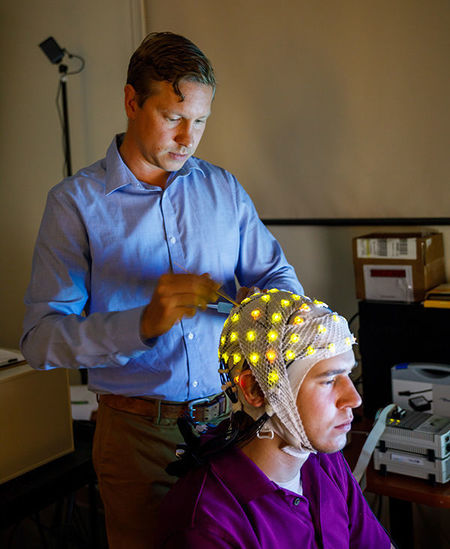Two Arts and Letters faculty members — sociologist Erin McDonnell and psychologist Nathan Rose — have received National Science Foundation Early Career Development (CAREER) Awards for 2020. They are among nine University of Notre Dame faculty members to receive the awards this year.
Since 2014, Notre Dame faculty have earned 49 NSF CAREER Awards — which provide five years of support to early-career faculty who “have the potential to serve as academic role models in research and education and to lead advances in the mission of their department or organization.”
“This is the most prestigious award granted by the NSF to early-career faculty and reflects the quality of Erin McDonnell’s and Nathan Rose’s research,” said Sarah Mustillo, the I.A. O’Shaughnessy Dean of the College of Arts and Letters. “I am thrilled that they are continuing the College’s strong record of success with these awards.”
McDonnell, an associate professor of sociology, was recognized for her project, “Pockets of Effectiveness and the Diffusion of Organizational Capacity,” which explores areas of organizational excellence within the Ghanaian state.
“This award really sets a platform for the next five years of my life,” McDonnell said. “It structures the major moments and movements of my career, charting this path and making it possible to do this really ambitious research I wouldn’t have been able to do otherwise.”
Rose, the William P. and Hazel B. White Collegiate Chair in psychology, received the award for his project, “Targeted Memory Reactivation with Transcranial Magnetic Stimulation,” which seeks to identify the mechanisms that enable the reactivation of information passively retained in working memory.
“It was incredibly validating and rewarding for me to receive the CAREER Award,” he said. “It will not just potentiate my career, but will enable us to offer undergraduate and graduate students the opportunity to find their niche and hone their research skills and career goals as well.”
“This is the most prestigious award granted by the NSF to early-career faculty and reflects the quality of Erin McDonnell’s and Nathan Rose’s research. I am thrilled that they are continuing the College’s strong record of success with these awards.”
— Sarah Mustillo, the I.A. O’Shaughnessy Dean of the College of Arts and Letters
Pockets of Effectiveness

McDonnell is exploring questions that emerged from her most recent book project, Patchwork Leviathan: Pockets of Bureaucratic Effectiveness in Developing States. That project examined groups or agencies in the public sector, especially in low-income states that are typically seen as weak and ineffectual, that are nevertheless incredibly effective.
Her next project tackles the question of whether and how those successful pockets can spread, using a case study of the commercial courts in Ghana. Once travel restrictions related to the coronavirus pandemic are lifted, McDonnell plans to travel to Ghana with a team of undergraduate student research assistants, to observe court proceedings and interview key members of the court system.
“The CAREER Award is focused on research and teaching being very intertwined, and I’m excited about the mentorship component of this project, both in terms of ways I can integrate this data into my classes and in terms of including students in the research process.”
The project will also include an annual workshop that will bring together advanced graduate students in different disciplines — including political science, sociology, public administration, and psychology — from across the country to examine issues surrounding effective statecraft.
McDonnell, who holds a concurrent appointment in the Department of Africana Studies and is a faculty fellow in the Kellogg Institute for International Studies, said that Notre Dame is one of the best places in the country to be doing international research, particularly in low-income countries.
“The resources that the University brings together through the College, the Kellogg Institute, and the Keough School of Global Affairs in terms of faculty and support is just unparalleled,” she said. “Just being in an environment where I’m talking constantly with colleagues in sociology and economics and political science who work on development — it refines your thinking in a way that is enormously helpful. That kind of robust, intellectual community was priceless for making this happen.”
“Just being in an environment where I’m talking constantly with colleagues in sociology and economics and political science who work on development — it refines your thinking in a way that is enormously helpful. That kind of robust, intellectual community was priceless for making this happen.”
— Erin McDonnell
Targeted Memory Reactivation

Rose’s project follows up on his groundbreaking research on noninvasive brain stimulation and working memory.
“We were able to stimulate different parts of people's brains through transcranial magnetic stimulation, and by decoding the neural activity, we could see that we were reactivating these memories that appeared to have been lost,” he said. “It was a really exciting finding and the first time anyone had shown that could be done — but we don't exactly know why or how we were able to recover these memories. So, it really opened up a lot more questions that we have to address.”
His long-term goal is to reveal how working memory — a system that’s vital for nearly all aspects of cognitive functioning — works and why it breaks down in older adults.
In this project, Rose is gathering evidence on the roles of the frontal, parietal, and sensory regions of the brain in storing and reactivating latent working memories. His research seeks to identify the precise neurocognitive processes that underlie age-related memory deficits. Rose also hopes to identify specific ways to use noninvasive brain stimulation to enhance working and long-term memory.
Rose’s research is a crucial part of the department’s increased focus on building a cognitive brain behavior program that includes neuroimaging and neurostimulation tools and technologies to help advance the training of psychology and neuroscience and behavior students.
The University’s commitment to developing this program was key to him winning the NSF CAREER Award, he said.
“I would not have been able to do this without the generous support of Notre Dame,” Rose said. “We have a beautiful new lab in Corbett Family Hall with state-of-the-art equipment that is one of only a handful of its kind in the world. I am also incredibly grateful for the support of my colleagues and the dean of the College in the development of this research.”
“I would not have been able to do this without the generous support of Notre Dame. We have a beautiful new lab in Corbett Family Hall with state-of-the-art equipment that is one of only a handful of its kind in the world. I am also incredibly grateful for the support of my colleagues and the dean of the College in the development of this research.”
— Nathan Rose


